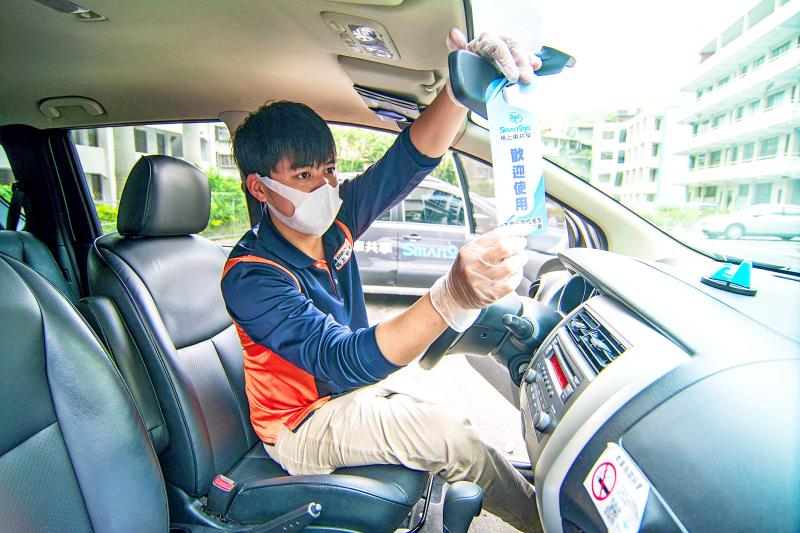The nation’s car rental industry has experienced a steep drop in business as people cancel travel plans and stay at home following a surge in local COVID-19 infections last month.
The slump in business is particularly damaging for some car rental firms and might push them into bankruptcy, the Chinese-language Liberty Times (the sister newspaper of the Taipei Times) reported yesterday, citing the Taipei Passenger Car Rental Association.
The association has called on the government to suspend vehicle fuel tax and vehicle license tax this year to help car rental companies overcome the difficulties, the newspaper reported.

Photo courtesy of Carplus Auto Leasing Co
The government last year halved the vehicle fuel and license taxes for car rental companies as part of its COVID-19 relief measures, the association said.
However, despite the situation this year being more severe than last year, the government’s latest “Stimulus 4.0” COVID-19 relief package contains no measures for the industry, leaving companies in a more miserable state, the association added.
Carplus Auto Leasing Corp (格上租車), a unit of Yulon Group (裕隆集團), has seen revenue from its short-term car rental and chauffeur service drop by nearly 70 percent, the Liberty Times reported.
The company’s rental business has been in the red since May 15, when the level 3 COVID-19 alert was first issued in Taipei and New Taipei City, it said.
Hotai Leasing Corp (和運租車), a subsidiary of Hotai Motor Co (和泰汽車), also experienced a collapse in rental bookings, the paper reported.
Hotai Leasing, whose iRent mobile app allows customers to make reservations, collect and return rental cars at different locations any time, said more than 4,000 of its vehicles are in parking lots and roadside parking spaces, while about 2,000 vehicles have been left idle at its local outlets, as people avoid travel, the newspaper reported.
The association urged the government to include the car rental business in its relief package and provide other aid options, such as subsidizing up to 40 percent of workers’ salaries for rental business and issuing a subsidy of NT$10,000 per month per chauffeur for three months.
The government could also help rental firms negotiate auto loan extensions with banks and offer them full-interest subsidies during the extension period, the association said.

NOT JUSTIFIED: The bank’s governor said there would only be a rate cut if inflation falls below 1.5% and economic conditions deteriorate, which have not been detected The central bank yesterday kept its key interest rates unchanged for a fifth consecutive quarter, aligning with market expectations, while slightly lowering its inflation outlook amid signs of cooling price pressures. The move came after the US Federal Reserve held rates steady overnight, despite pressure from US President Donald Trump to cut borrowing costs. Central bank board members unanimously voted to maintain the discount rate at 2 percent, the secured loan rate at 2.375 percent and the overnight lending rate at 4.25 percent. “We consider the policy decision appropriate, although it suggests tightening leaning after factoring in slackening inflation and stable GDP growth,”

DIVIDED VIEWS: Although the Fed agreed on holding rates steady, some officials see no rate cuts for this year, while 10 policymakers foresee two or more cuts There are a lot of unknowns about the outlook for the economy and interest rates, but US Federal Reserve Chair Jerome Powell signaled at least one thing seems certain: Higher prices are coming. Fed policymakers voted unanimously to hold interest rates steady at a range of 4.25 percent to 4.50 percent for a fourth straight meeting on Wednesday, as they await clarity on whether tariffs would leave a one-time or more lasting mark on inflation. Powell said it is still unclear how much of the bill would fall on the shoulders of consumers, but he expects to learn more about tariffs

Greek tourism student Katerina quit within a month of starting work at a five-star hotel in Halkidiki, one of the country’s top destinations, because she said conditions were so dire. Beyond the bad pay, the 22-year-old said that her working and living conditions were “miserable and unacceptable.” Millions holiday in Greece every year, but its vital tourism industry is finding it harder and harder to recruit Greeks to look after them. “I was asked to work in any department of the hotel where there was a need, from service to cleaning,” said Katerina, a tourism and marketing student, who would

i Gasoline and diesel prices at fuel stations are this week to rise NT$0.1 per liter, as tensions in the Middle East pushed crude oil prices higher last week, CPC Corp, Taiwan (台灣中油) and Formosa Petrochemical Corp (台塑石化) said yesterday. International crude oil prices last week rose for the third consecutive week due to an escalating conflict between Israel and Iran, as the market is concerned that the situation in the Middle East might affect crude oil supply, CPC and Formosa said in separate statements. Front-month Brent crude oil futures — the international oil benchmark — rose 3.75 percent to settle at US$77.01